An edited version of this article appeared in the July 2013 edition of ASA Alumni Magazine.
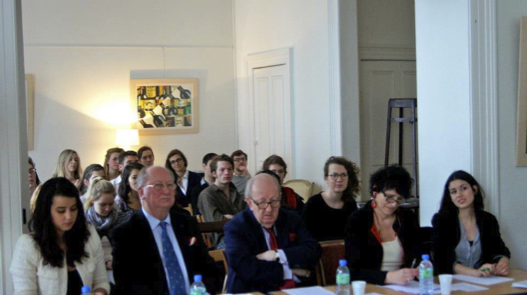
French students using British Parliamentary style to Debate in French at the Institut Français de Londres
Middle Age Historians report that the early success of Oxford, and lets assume probably the largest part of the English –back then– Higher Education system, started thanks to the ban by King Henry II on English scholars going to study in France (mainly in Paris). For many reasons, scholars and academics gathered in Oxford to continue their research & work. In 1167, the ban applied to 55 scholars, but after 846 years of epic relations ranging from the Hundred Years’ War to the Entente Cordiale, today’s figures have somewhat changed.
At first glance, France is world-famous for wine and food whereas the UK has developed an international cooking style and winegrowers in Devon are still struggling with the weather to produce Syrah & Pinot meunier (awaiting a more radical climate change effect). In terms of demography, the two countries present fairly similar figures regarding their population, as well as for high school boys and girls going to either Lycée Républicain or Grammar, Public and even Comprehensive schools so as to get prepared for their “bac”, GCSE and A-Levels.
Even though the enrolmentratio in the Higher Education system is higher in the UK for a smaller resident population than in France (a partial answer can be found within the 120 000 extra foreign students in the UK – only 250 000 in France in 2009), the two countries remain fairly similar regarding their educational market in the age of globalisation and 26 years after the first Erasmus generation.
What can we squeeze out of the data?
The UK, an island draining a large part of European & non-European students
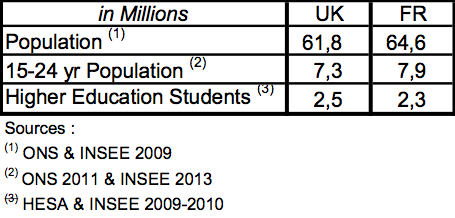
The UK and France attract a large quantity of foreign students every year. The UK is the second most favoured destination for international students after the USA and France ranks 4th after Australia (source: Campus France). Outside the Erasmus scheme, EU students in France and the UK barely represent a fourth of the foreign students. This means that a vast majority of international students travel long distances (mainly from Asia) to get a degree in either country. Whereas the UK has about 25% more foreign students than France with regards to the entire domestic student population, European students represent a twice larger population than the one in France.
The Erasmus scheme –benefiting 213 266 students in 2009-2010– has over the years had a certain impact on how graduate professionals work and interact interculturally but the numbers still remain low when compared to the 540 000 European international students out of the 3.6 million international students in the World (source: UNESCO – Campus France 2010). Looking at the population of Erasmus, it accounts for 0.7% (the UK) to 1% (France) of the domestic student population and in the latter case, France has a slightly net privilege.
Regarding the Erasmus programme, British students would be easily considered as islanders with 0.5 % of the student population enrolling for Erasmus. French students are more adventurous (setting aside their chauvinistic reputation), as there are more and more of them travelling during their studies (+ 12% between 2006 and 2010).
Higher proportion of French students registering directly to a UK institution than British enrolling for Erasmus
About two-thirds of the British students enrolling for Erasmus actually go “on their own” to French Higher Education institutions. The likeliness of French students to register directly to a British University is even higher.
France importing & exporting “La Bohème” successfully with Erasmus
In 2009, France was the second most sought after country for Erasmus after Spain. France hosts about a tenth of all Erasmus students every year. Within the Erasmus Programme, there is a clear tendency of the French to travel during their studies over the British and more Erasmus exchange students come to France to study (in French mainly) among EU27 + 5 countries. For each student crossing the Channel from the UK to France for his/her Erasmus, there is about one French Erasmus student who crosses it as well. (around 4400 students for each country every year).
The attractiveness of a country for foreign students (European & non European) is apparently driven by the wide-spread use of the English language (top 3 USA, UK and Australia) but they might also be a correlation with International rankings (Times Higher Education, ARWU, etc.).
Regarding the Erasmus scheme, the reasons for a EU student to pick (and get the agreement signed) for a country are clearly different from another EU student applying directly for a degree in a EU27 country. Erasmus offers a subsidised short stay with quasi-automatic transfer of ECTS credits to the home institution whereas applying directly to a different country like the UK is more dependent on availability of scholarships and a longer period away from home.
France is well demanded by Erasmus students for its education (encompassing lifestyle) and a large part of the few British students who apply actually go to France whereas a smaller portion of the “many” French end up in the UK.
Where the Erasmus scheme is following an intra-EU developpement path (with some “reluctant to become part of the EU countries”), it is not the predominant catalyst in the EU for cross-border studies. As the article shows, students, already apply and cross the Channel with their own financing scheme (as the French do).
The Franco-British dimension is clearly highlighted (UK Erasmus going to France, French students massively reading in the UK) thanks to the short distance and fast trains. The Franco-British dimension has also been fostered lately -—aside from recurrent political discontent—- with initiatives such as the creation of the University of London Institute in Paris and Queen Mary’s in Paris, allowing British Students to study BA & MA in Humanities or LLM– hosted on the Invalides. Other bilateral agreements for exchange or dual diplomas have been successfully put into practice in science & engineering between Ecole Centrale Paris & Cambridge, and in the social sciences between Sciences Po Lille & University of Kent, Sciences Po Paris & LSE, Paris 1 Panthéon-Sorbonne and King’s College London to name a few.
This study should be completed by data on students gathering a cross Channel education (Bachelor then Masters), the regional dimension (the City and the French Riviera) and the fields of education. All these trends and initiatives demonstrate that Henry II has probably helped Oxford to develop at a crucial point in History but curiosity, intercultural experience and linguistic exposure could not be constrained forever. Policies and political leadership have changed since the 12th Century and perhaps a transnational study scheme could, aside from Erasmus, promote the EU’s multilingual academic path at a larger scale.
Jean-Pascal Sibiet
For further reading on Franco-British Studies & Research: Philippe LANE & Maurice FRASER, eds., (2011) Franco-British Academic Partnerships : the Next Chapter, Liverpool University Press, p. 241
More insight on French & British Education systems & social mobility : Cordial Debate Prize 2012-2013 : http://www.fb-connections.org/is-the-french-educational-system-better-at-promoting-upward-social-mobility-than-the-british-one/
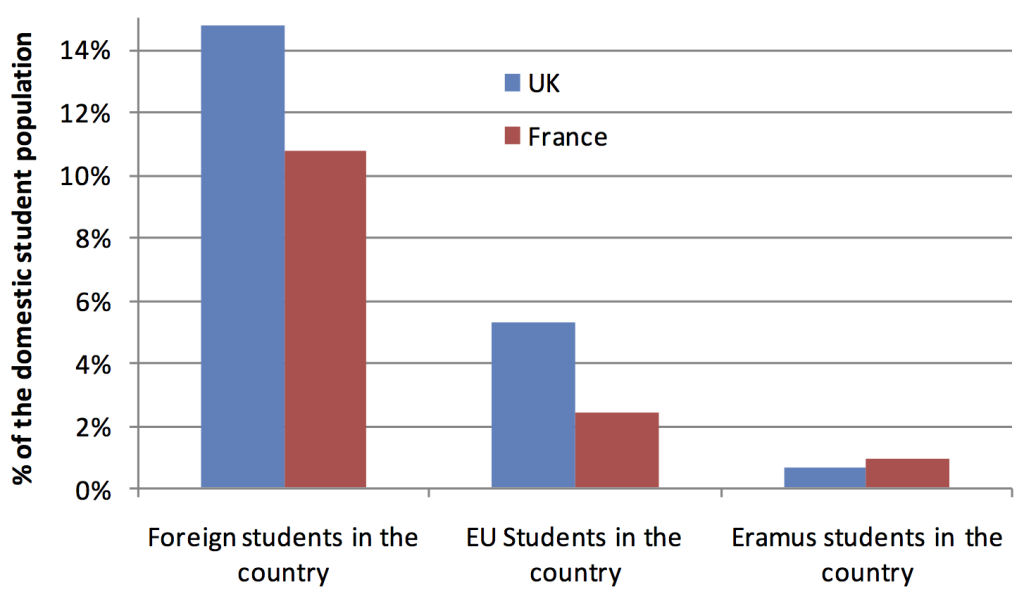
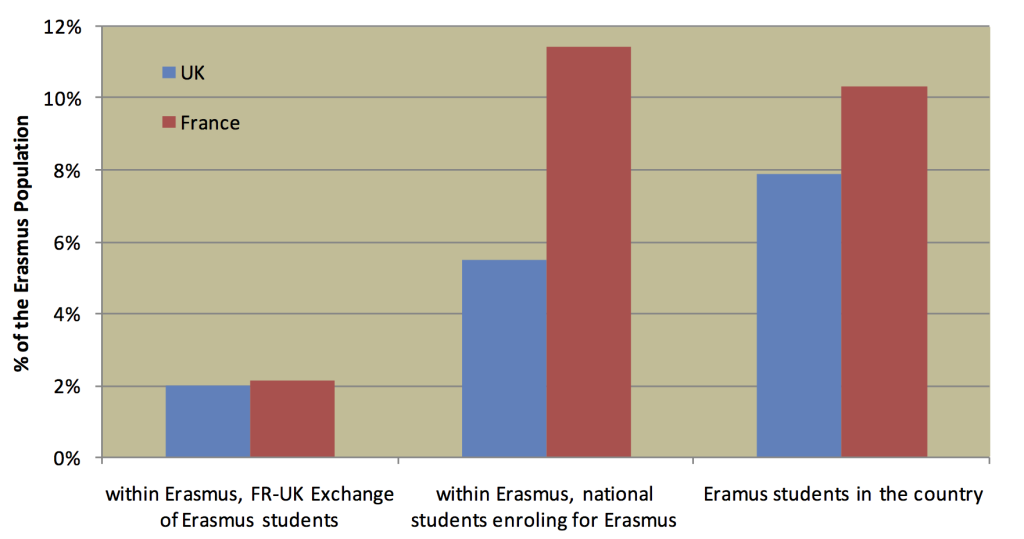
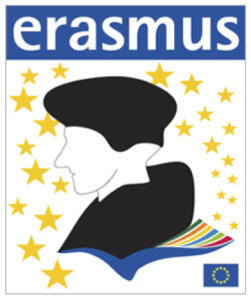
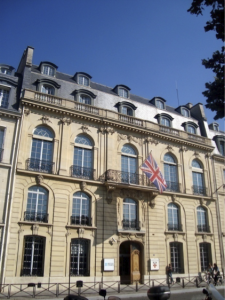



Pingback: Digital Education – Higher Education: France, the United Kingdom and Overseas #DigitalEducationUKFR | Franco-British Connections
Pingback: (BR)EXIT, les jeunes ?! | Franco-British Connections